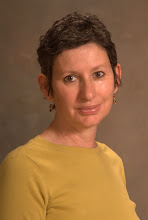Although I have yet to face my oncologist with this decision, I told his nurse practitioner that I'm declining the invitation to become a human test subject. I've decided against joining the national clinical trial researching the impact of osteoporosis medicines on reducing breast cancer metastasis to the skeletal system.
No single fact tipped my hand. Rather, the cumulative bad news concerning these drugs, known as bisphosphonates, weighed too heavily against their possible benefits, at least for me. First, their potential to destroy the jaw bone irreparably, while a statistically rare side effect, was still a frightening one. Moreover, anecdotal evidence about the jaw problem just keeps surfacing, making me question how rare this side effect actually is. Meanwhile, this class of drugs has been linked to other health problems. Just last week, one such drug, Fosamax, was blamed for incidents of irregular heart beats. Additionally, in January, the FDA issued a warning advising that Fosamax and other bisphosphonates marketed as Boniva, Reclast, Zometa and other labels may be responsible for a sudden onset of musculoskeletal pain. That's three medical complications l'd like to avoid, but who's counting.
My overall bone health is still a question mark. With last week's surgery, we delayed the diagnostic bone density test. If my bones are crumbling, I may have to take bisphosphonates anyway, but at least my doctor and I can select the specific drug and dosage, rather than being constrained by the protocols of a clinical trial.
Genetics, of course, plays a big role here, and I don't know of any family history of osteoporosis. But you're never completely certain that a grandparent or great-grandparent didn't suffer from a particular health problem. Case in point: Since learning I had breast cancer, I've been telling doctors that I have no family history of the disease. That was before the postman brought a card last week from my Aunt Sallie. In her mid-eighties, Sallie is my father's eldest sister. She lives in Colorado with their third sibling, my Aunt Mary Jeanne. Both of my father's parents were deceased before I was born. Growing up, I rarely saw these aunts, and I know very little about my father's branch of our family tree.
So I read with great interest Sallie's information that my paternal great-grandmother died of breast cancer. Unfortunately, this nugget was the sum total of what Sallie revealed about her. Since she was a great-grandmother, and thus a few generations removed from me, I don't know how medically significant this fact is. But my curiosity is still peaked. What was her maiden name? How old was she when she died? What was her ethnic background? Where was she born?
Each of us is the amalgamation of so much genetic code. Beyond the color of our eyes or the texture of our hair, our forefathers give us a propensity for so much else -- from heart disease, to blood disorders, to alcoholism, to longevity. Learning their life histories can be fascinating from a self-awareness point of view. Now I see that it's also medically useful. The next thing I write should be another letter to Aunt Sallie.
5/9/08
Subscribe to:
Post Comments (Atom)





No comments:
Post a Comment